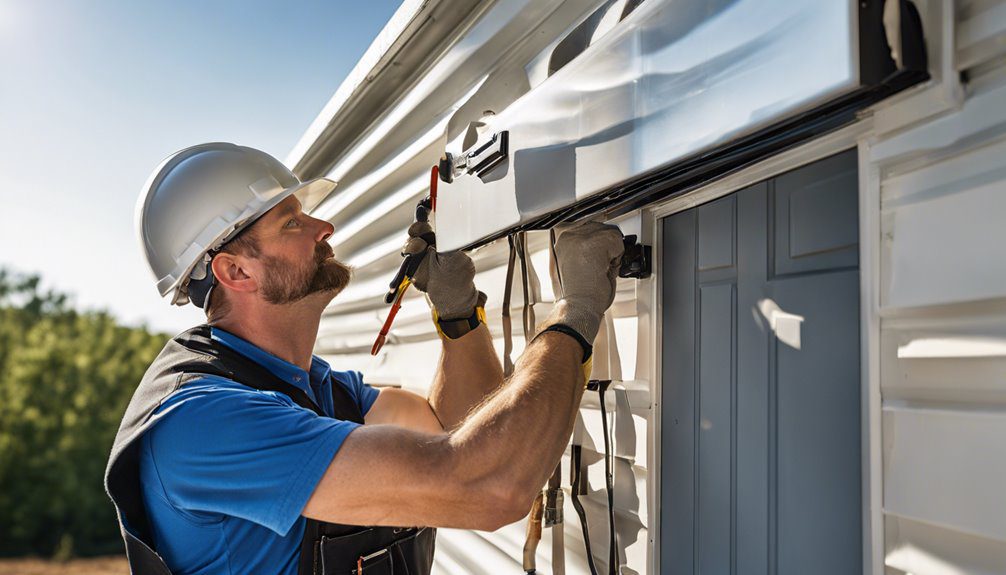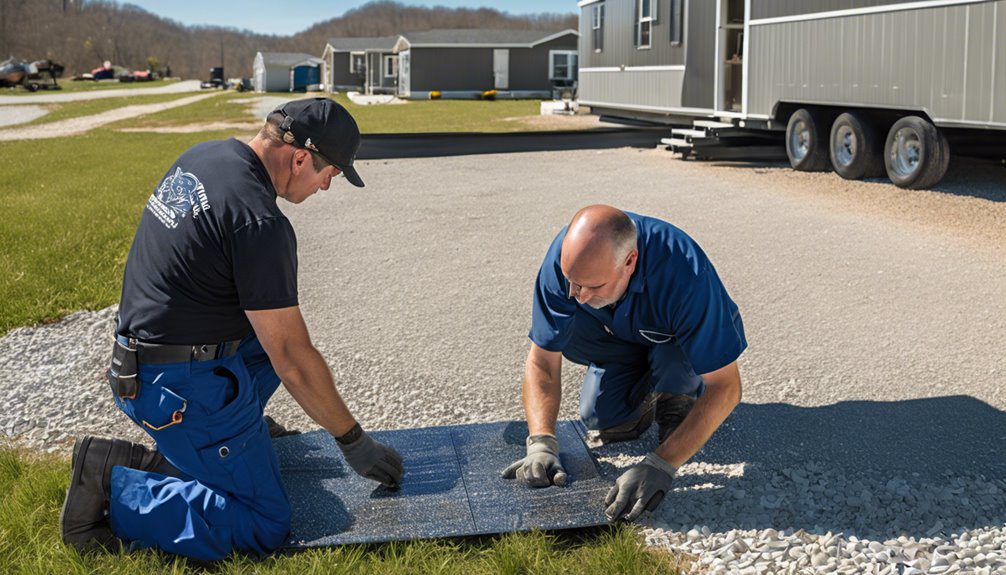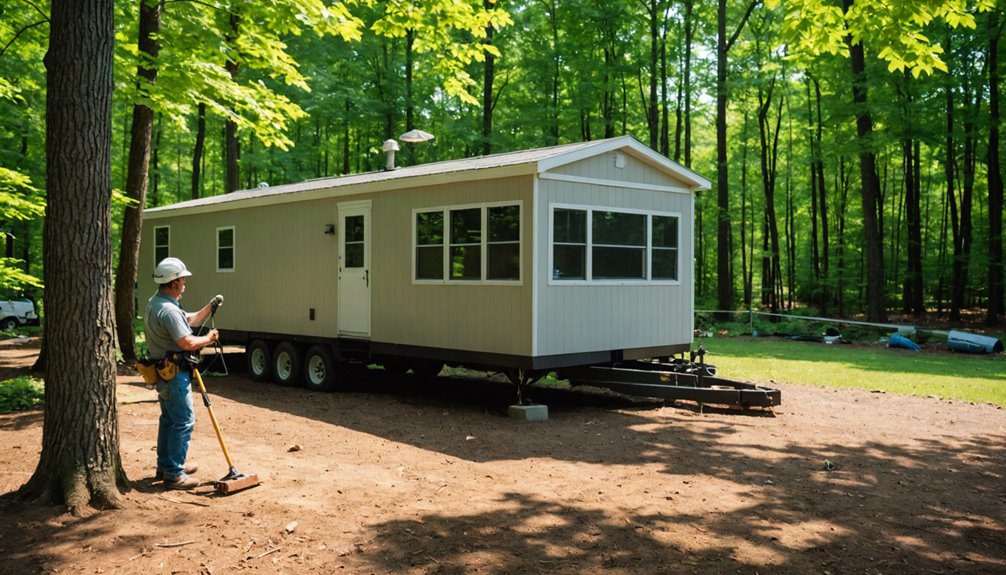When you're considering hiring a contractor for manufactured home installations in Tennessee, understanding the importance of the Manufactured Home Stabilizing System Installer Bond is crucial. This bond not only protects you from potential losses but also reflects the contractor's commitment to quality and compliance with regulations. You'll want to know what the bonding process entails and how it impacts both your project and the contractor's credibility. So, what are the key factors you should be aware of before making your decision?
Importance of Installer Bonds

Installer bonds play a crucial role in the manufactured home industry, ensuring that both homeowners and contractors are protected. When you decide to work with a manufactured home installer, knowing that they hold a valid bond gives you peace of mind. These bonds serve as a financial guarantee, ensuring that the installer will comply with local laws and regulations. If something goes wrong—like poor workmanship or failure to complete the job—you can seek compensation through the bond.
For contractors, having an installer bond boosts your credibility. It shows potential clients that you're serious about your work and willing to take responsibility. This can set you apart from competitors who don't have the same level of commitment.
Moreover, being bonded often opens up more opportunities for you, as many homeowners prefer working with installers who are financially backed. With the assurance of financial protection for consumers, installer bonds encourage ethical practices within the industry.
Ultimately, installer bonds foster trust in the manufactured home industry. They create a safer environment where homeowners can feel confident in their investment, and contractors can build a solid reputation.
Understanding the Bond Requirements
When navigating the bond requirements for manufactured home installers, it's essential to understand what's needed to ensure compliance. In Tennessee, you'll need a specific bond to operate legally. This bond protects your clients and the public by guaranteeing that you'll adhere to the state's laws and regulations regarding manufactured home installations.
Typically, the bond amount varies based on your business operations and the number of homes you plan to install. You'll want to check the latest guidelines to determine the exact amount required.
It's also crucial to note that the bond isn't just a formality; it serves as a safety net against potential claims resulting from your work.
Before applying for the bond, ensure you have all necessary documentation ready, including your business license and proof of insurance.
Keep in mind that the bonding company may conduct a background check, so maintaining a good reputation is vital.
By comprehensively understanding these requirements, you can avoid pitfalls that might delay your ability to work.
Application Process Overview

To successfully navigate the application process for a Tennessee manufactured home installer bond, you'll need to gather several key documents and information beforehand.
Start by ensuring you have your business license, which verifies your legitimacy as an installer. Next, you'll want to provide proof of insurance, as this demonstrates your financial stability and protects your clients.
Once you have these documents ready, you can complete the bond application form. Be prepared to include details about your business, such as its name, address, and contact information.
It's also beneficial to know the bonding amount required for your specific situation, as this can vary.
After filling out the application, you'll need to submit it to the appropriate bonding company along with your gathered documents.
The bonding company may conduct a background check, so ensure your records are clear.
Once approved, you'll sign the bond agreement and pay any required fees.
Financial Implications of the Bond
Understanding the financial implications of a Tennessee manufactured home installer bond is crucial for your business's sustainability. The bond typically requires you to pay a premium, which can vary based on your credit score and the bond amount. This upfront cost can impact your budget, so it's important to factor it into your financial planning.
Moreover, if claims are made against your bond, you'll be responsible for repaying the surety company. This repayment can strain your finances, particularly if the claims are significant. Maintaining a good reputation is essential, as frequent claims may lead to higher premiums or even difficulty obtaining a bond in the future.
Additionally, the bond serves as a safety net for your clients, which can enhance your credibility. Clients may be more willing to engage your services knowing they're protected against potential issues. This is similar to how Illinois Surety Bonds provide financial security for project completion.
On the flip side, failing to secure the bond could limit your ability to operate legally in Tennessee, resulting in lost income and potential fines.
Ultimately, understanding these financial implications helps you make informed decisions, ensuring your business remains compliant and profitable. Prioritize your bond cost as a critical part of your overall business strategy.
Duration and Renewal of the Bond

Securing a Tennessee manufactured home installer bond typically lasts for a period of one year. This means that once you obtain the bond, it remains valid for twelve months from the effective date.
It's crucial to keep track of this timeline, as your ability to operate legally hinges on maintaining an active bond.
As the expiration date approaches, you'll need to consider renewing the bond to ensure uninterrupted compliance with state regulations. The renewal process often involves submitting a new application and paying the required premium.
If there are no changes in your circumstances or claims against you, the renewal should be straightforward.
However, if you've had claims made against your bond during the past year, it's wise to consult with your bonding company about potential impacts on your renewal. They may adjust your premium based on your claims history.
Consumer Protection Aspects
While you navigate the process of becoming a licensed manufactured home installer in Tennessee, it's essential to recognize the consumer protection aspects tied to your bond. This bond acts as a safety net for consumers, ensuring that if you fail to meet your contractual obligations or cause damages, they've a means of recovery.
By securing this bond, you're not just complying with legal requirements; you're also demonstrating your commitment to quality and professionalism. Consumers can feel more confident knowing that your bond provides a layer of financial security.
If they experience issues with your work, they can file a claim against the bond, which can cover losses up to the bond amount. This process encourages you to maintain high standards in your services, as it's in your best interest to avoid claims and protect your reputation.
Moreover, the bond serves as a deterrent against unethical practices. Knowing that your work is being monitored helps ensure that you maintain integrity in your business dealings. Additionally, having a bond enhances consumer trust in the services provided, which is crucial in the competitive landscape of the installation industry.
Ultimately, the bond aligns your interests with those of the consumers, fostering trust and accountability in the manufactured home installation industry.
Consequences of Non-Compliance

Non-compliance with the regulations surrounding your manufactured home installer bond can lead to serious repercussions. If you fail to adhere to these regulations, you risk facing fines or penalties that can significantly affect your business.
These financial consequences may not only strain your resources but also damage your reputation in the industry.
Moreover, non-compliance could result in the suspension or revocation of your installer license. This means you wouldn't be able to legally operate in Tennessee, leading to a loss of income and potential clients.
If you continue working without a valid bond or license, you expose yourself to legal action from consumers or regulatory bodies, which could further complicate your situation.
In the event of a claim against your bond, failure to comply with required regulations can leave you personally liable for damages, increasing your financial burden.
You might also face difficulties when trying to obtain future bonds, as underwriters may view your non-compliance as a red flag. Additionally, surety companies may consider your non-compliance history when evaluating your risk profile for future bond applications.
Ultimately, prioritizing compliance is essential to ensure your business thrives and avoids the serious consequences of non-compliance.
Industry Standards and Regulations
Understanding industry standards and regulations is crucial for manufactured home installers in Tennessee. These guidelines ensure that your work meets safety, quality, and performance expectations. Familiarizing yourself with the Tennessee Manufactured Home Commission's rules is essential since they set the framework for installation practices.
You'll need to comply with local building codes, which often dictate specific installation techniques and materials. These codes are designed to protect residents from potential hazards and ensure the structural integrity of manufactured homes.
Moreover, staying updated on the latest regulations helps you avoid penalties and guarantees that your installations are legally sound.
It's also important to understand the National Fire Protection Association (NFPA) standards, as they pertain to the installation of electrical and plumbing systems in manufactured homes. Adhering to these standards isn't just about compliance; it's about providing safe living environments for your clients.
In addition, you may face requirements regarding licensing and bonding, which help establish credibility within the industry. Understanding the significance of Louisiana Surety Bonds can also provide insight into the financial assurances required for contractors in the manufactured home sector.
Steps to Choose a Reliable Installer

Choosing a reliable manufactured home installer involves a few key steps that can save you time and ensure quality work.
First, do your homework. Research local installers, checking their online reviews and ratings. Look for feedback from previous clients to gauge their reputation.
Next, ask for recommendations. Talk to friends, family, or neighbors who've had similar work done. Personal experiences can point you to trustworthy professionals.
Once you have a list, verify their credentials. Ensure they're licensed and insured, as this protects you from potential liabilities.
After that, request multiple quotes. Compare the services offered and the costs involved. Don't automatically choose the lowest bid; instead, evaluate the overall value, including experience and materials used. Additionally, consider working with bonded dealers to enhance your protection and confidence in the installation process.
Benefits of Being Bonded
Being bonded offers significant advantages for both installers and homeowners, as it provides financial protection and peace of mind.
For you as an installer, being bonded demonstrates your professionalism and commitment to quality work. It signals to potential clients that you've met specific standards, which can set you apart in a competitive market.
For homeowners, a bonded installer means you're protected against potential losses due to incomplete or faulty work. If something goes wrong with the installation, you have a safety net to fall back on. The bond serves as a guarantee that you'll receive compensation if the installer fails to deliver on their promises or if they violate regulations.
Additionally, being bonded can enhance your reputation and credibility within the industry. Clients are more likely to trust you, knowing you've taken extra steps to protect their investment. Moreover, being bonded establishes client confidence that you adhere to legal and ethical standards in your work.
Conclusion
In conclusion, securing the Tennessee Manufactured Home Stabilizing System Installer Bond is crucial for your credibility and compliance in the industry. It protects both you and your clients, ensuring quality work and adherence to safety standards. By understanding the bond requirements and following the application process, you not only enhance your professional reputation but also foster trust with homeowners. Remember, being bonded isn't just a regulatory obligation; it's a valuable investment in your business's future.


